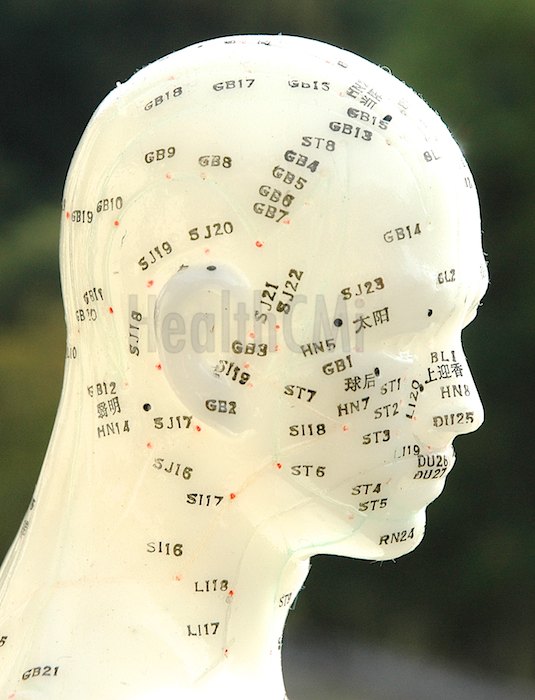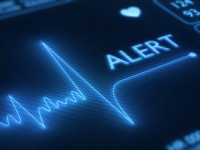Newly published research confirms that acupuncture reduces hypertension, high blood pressure.  Real acupuncture was found more effective than both a non-acupuncture control and a sham acupuncture control in this new laboratory experiment. As a result of this controlled experiment, the researchers concluded that acupuncture has a “stable antihypertensive effect.”
Real acupuncture was found more effective than both a non-acupuncture control and a sham acupuncture control in this new laboratory experiment. As a result of this controlled experiment, the researchers concluded that acupuncture has a “stable antihypertensive effect.”
The researchers investigated the effects of needling acupuncture point KI3 (KD3, K3, Taixi). Interest for this study was based on other recent published research. The researchers note, “Many animal and clinical studies have reported the efficacy of acupuncture in reducing hypertension.”
Standard acupuncture treatments usually involved the application of acupuncture point prescriptions with more than one acupuncture point. This study isolated the effects of a single acupuncture point on laboratory rats with hypertension. The researchers conclude acupuncture at KI3 has an “antihypertensive effect for essential hypertension.”
This new research manages to isolate a single acupuncture point in a laboratory animal experiment. Human clinical studies have confirmed these results. This includes individual case studies and group controlled trials. These studies demonstrate that acupuncture lowers blood pressure in cases of hypertension and reduces or eliminates the side effects of medications.
A recent human case study measured significant results using acupuncture points LI4, LI11, ST36 and ST9. A patient began the study with blood pressure at 160/100 mm Hg. Medications lowered the blood pressure to 150/99 mm Hg. Acupuncture was added to the clinical regime and the blood pressure reduced to 130/80 mm Hg. This is a modern example of combining acupuncture with medications to achieve optimum results in patient outcomes.
Acupuncture was also successful in eliminating the side effects of the antihypertensive medication. Acupuncture points CV4, CV6 and SP6 were used to combat flushing, diarrhea, palpitations, fatigue, decreased sexual function and several other adverse effects caused by the antihypertensive medication. Acupuncture served two successful functions. It allowed a further lowering of blood pressure to normal levels and acupuncture eliminated the side effects of the medication.
The acupuncture needles were inserted bilaterally and perpendicularly to a depth of 0.8 to 1.0 cun. Tonification needle techniques were applied to LI11, ST36 and ST9 using a twirling technique for a duration of 1 minute. LI4 was stimulated with a twirling, reducing method for 1 minute. The total duration of needle retention per acupuncture treatment was 30 minutes. A total of 60 acupuncture treatments over the course of 12 weeks was administered.
The authors of the study note that abundant research supports the use of acupuncture points LV3, LI11, GB20, ST36 and ST40 for the treatment of hypertension. The researchers chose the acupuncture point prescription for this patient based on Traditional Chinese Medicine (TCM) meridian theory. Yangming channel acupuncture points such as LI11, ST36 and LI4 were chosen for their ability to ‘reconcile qi and blood.’ Additionally, ST9 was included for its specific function in regulating qi and blood and because it is a meeting point of the Stomach and Gallbladder meridians. The authors also note ST9’s proximity to the carotid sinus and its specialized ability to regulate blood pressure.
Additional research finds acupuncture effective in reducing blood pressure and in reducing the side effects of medications. Another recent study concluded that “acupuncture should be in the hypertension treatment guidelines and widely used for blood pressure regulation.”
Patients in this study had been taking antihypertensive medications for at least 24 months. Each subject was taking between one and three medications for the treatment of hypertension. The pharmaceutical classes of drugs were a combination of ACE inhibitors, diuretics and/or beta blockers. The patients experienced medication side effects including exhaustion, dizziness, weakness, joint pain, headaches, sleeping disorders, edema, a feeling of coldness in the extremities and depression.
The patients received acupuncture treatments every other day for a total of 15 treatments. The researchers discovered that combining acupuncture with medications resulted in two beneficial medical outcomes. Overall systolic and diastolic blood pressure levels reduced significantly. Secondly, patients reported less side-effects from the medications.
In yet another recent study, investigators discovered that acupuncture lowers blood pressure in human patients with hypertension who are taking hypertension medications. Acupuncture reduced the systolic and diastolic blood pressure and NO (nitric oxide) concentration increased. Prior research demonstrates that nitric oxide (NO) levels are directly related blood pressure levels and therefore the effect of acupuncture on NO levels were documented.
A total of ten acupuncture treatments were administered to each patient at a rate of one acupuncture treatment per week. The acupuncture points used in the study were Yintang, ST36, SP6, HT7, LI4, SP9, LV3 and KI3. The investigators documented that acupuncture is effective in lowering blood pressure levels for patients with hypertension.
These findings were confirmed in another study using a similar acupuncture point prescription. Patients were given acupuncture at acupoints SP9, LI4, LV3, LI11 and ST9. The researchers concluded that acupuncture reduces hypertension both in the long and short-term for both systolic and diastolic blood pressure levels.
Researchers at the University of California, Irvine and University of California, Los Angeles concur that acupuncture is effective in lowering blood pressure. Their study investigated the effectiveness acupuncture points P5, P6, LI10 and LI11 combined with electroacupuncture for the treatment of hypertension. The researchers concluded that acupuncture successfully reduces hypertension. The researchers discovered an additional finding; the application of this acupuncture treatment prescription protocol protected heart tissues and reduced arrhythmias.
Taking the study one step further, the researchers investigated how acupuncture achieves positive clinical outcomes for patients with high blood pressure. They discovered that electroacupuncture stimulates neurons in specific brain regions that control sympathetic nerve stimulation throughout the body. The investigators mapped the neurological network stimulated by acupuncture and concluded that it is acupuncture’s ability to activate brain centers that allows it to lower high blood pressure.
Another recent study finds acupuncture effective for reducing high blood pressure and preventing damage to the kidneys. In a controlled laboratory experiment, researchers applied two acupuncture points to laboratory rats with hypertension and renal interstitial fibrosis, a kidney disease characterized by destruction of the renal tubules and capillaries. Acupuncture “significantly decreased” blood pressure and decreased “damage of kidney morphology.”
Three groups were compared. Group 1 received acupuncture. Group 2 was a control group and group 3 received pharmaceutical medication. The drug group received perindopril, an ACE inhibitor used for the treatment of high blood pressure and other forms of heart disease. The acupuncture group received electroacupuncture at LI11 (Quchi) and ST36 (Zusanli) for a period of 20 minutes at a rate of once per day. Blood pressure, kidney morphology, optical densities of kidney collagen with immunohistochemistry, and expression of TGF-beta1 mRNA with reverse transcription polymerase chain reaction method changes were measured.
The acupuncture group had similar results as the medication group in that TGF-beta1 mRNA expression was decreased. The acupuncture group showed significantly lower blood pressure and less pathological structural changes to the kidneys. The pathological depositional area of collagen in the acupuncture group also showed clinical benefits with a significant reduction of both type I and type III collagen. The researchers concluded that acupuncture at LI11 and ST36 “probably intervenes the process of RIF (renal interstitial fibrosis) by reducing synthesis of kidney type I, III collagen and restraining expression of TGF-beta1.” 
The accelerating body of evidence demonstrating acupuncture’s ability to regulate blood pressure includes several important components. First, acupuncture is effective in combating hypertension. Secondly, acupuncture enhances medication therapy with a synergistic effect. Thirdly, acupuncture reduces the side effects of medications. Fourthly, acupuncture prevents damage to bodily tissues that are often pathologically affected by hypertension. Fifthly, the mechanisms of acupuncture’s effective action have been measured in cortical and biochemical experiments.
The quality and quantity of research into acupuncture’s effectiveness for the treatment of hypertension continues to improve. Laboratory experiments, case studies and group clinical trials now confirm positive clinical outcomes. The question moving forward is no longer, “Does acupuncture work?” The question is now, “How will acupuncture be integrated into conventional medical settings?”
The researchers performing the laboratory experiment on acupuncture KI3 cited important and somewhat alarming figures. Hypertension affects approximately 65% of individuals over the age of 60. Worldwide, hypertension affects approximately 1 billion people and is a risk factor for cardiovascular related diseases including stroke, heart failure and renal failure. Approximately 7 million people die every year as a result of hypertension.
The researchers note that antihypertensive medications are effective and have minimal side-effects. However, they also note that health care related costs continue to escalate. In 2010, hypertension is estimated to have cost more than $70 billion in “health care services, medications, and missed days of work in the United States.”
Issues with food production and distribution, exercise, stress and lifestyle contribute to the prevalence of widespread hypertension. Medications, dietetics, stress management and exercise are effective components to combatting this disease. Acupuncture has demonstrated efficacy in fighting hypertension and is already providing clinical results in small clinics, group practices and, on a limited scale, the hospital setting.
Scale becomes a major issue in advancing acupuncture therapy to patients with hypertension. There are only approximately 20,000 licensed acupuncturists in the USA and about half of them are in California. A major challenge will be to establish protocols for the integration of acupuncture into conventional medical settings.
The inclusion of acupuncture into the Medicare system has not been established. This greatly reduces utilization. Many insurance policies provide some form of acupuncture coverage, however, many health insurance policies limit reimbursement of acupuncture office visits to conditions involving acute and chronic pain. These barriers to care must be removed before large scale use of acupuncture can ramp up to meet the medical need of the public.
References:
Antihypertensive Effect of Acupuncturing at KI3 in Spontaneously Hypertensive Rats, Shaoyang CUI, Mingzhu Xu, Shuhui Wang, Chunzhi Tang, Xinsheng Lai, Zhiqi Fan; Shenzhen Futian Hospital of TCM, Guangzhou University of Chinese Medicine; 2013 IEEE International Conference on Bioinformatics and Biomedicine.
Zhang, Lili, Pengfei Shen, and Shu Wang. "Acupuncture treatment for hypertension: a case study." Acupuncture in Medicine (2013): acupmed-2013.
Cevik, C., and S. O. Işeri. "The effect of acupuncture on high blood pressure of patients using antihypertensive drugs." Acupuncture & electro-therapeutics research 38, no. 1-2 (2012): 1-15.
Severcan, C., C. Cevik, H. V. Acar, A. B. Sivri, S. S. Mit, E. Geçioğlu, O. T. Paşaoğlu, and Y. Gündüztepe. "The effects of acupuncture on the levels of blood pressure and nitric oxide in hypertensive patients." Acupuncture & electro-therapeutics research 37, no. 4 (2012): 263.
Hongguo Zhen Jiu. 2012 Sep;32(9):776-8. [Observation of anti-hypertensive effect on primary hypertension treated with acupuncture at Renying (ST 9) mainly]. Yin C, Du YZ. Graduate Faculty of Tianjin University of TCM, China.
Evidence-Based Complementary and Alternative Medicine. Volume 2012 (2012), Article ID 878673, 9 pages. doi:10.1155/2012/878673. Neuroendocrine Mechanisms of Acupuncture in the Treatment of Hypertension. Wei Zhou and John C. Longhurst. Department of Anesthesiology, David Geffen School of Medicine, University of California, Los Angeles. Department of Medicine, University of California, Irvine.
Chen, Z. J., Y. Qu, L. D. Zhang, Y. Liu, S. S. Wang, and L. Y. Gu. "[Effects of acupuncture on kidney morphological structure and expression of TGF-beta1 mRNA in rats with spontaneous hypertension]." Zhongguo zhen jiu= Chinese acupuncture & moxibustion 33, no. 9 (2013): 824-828.


